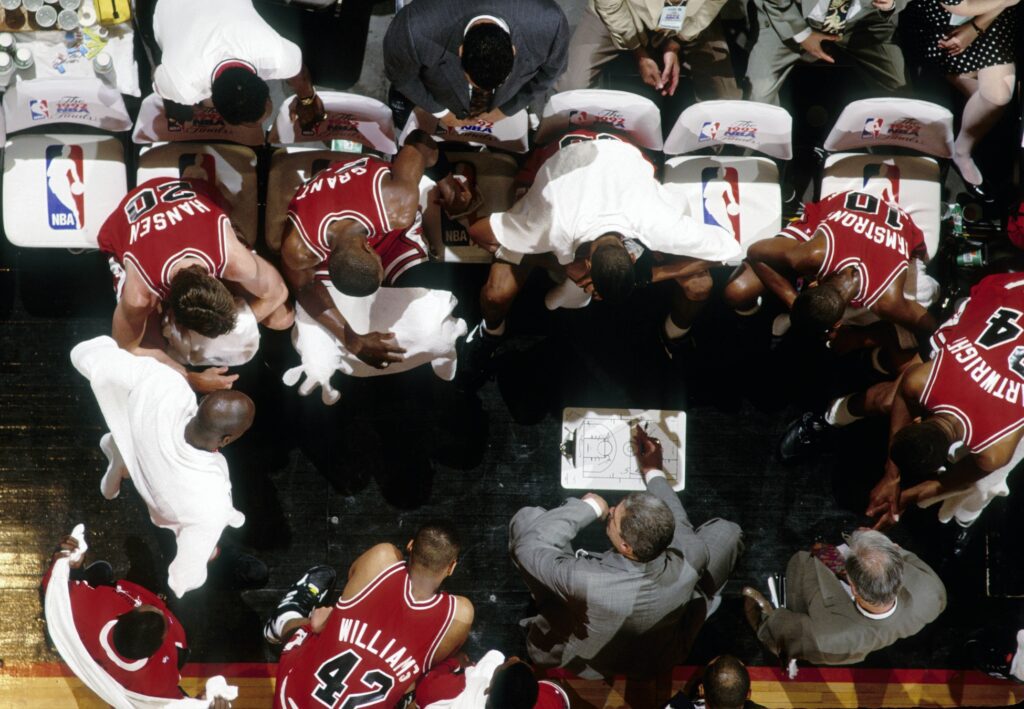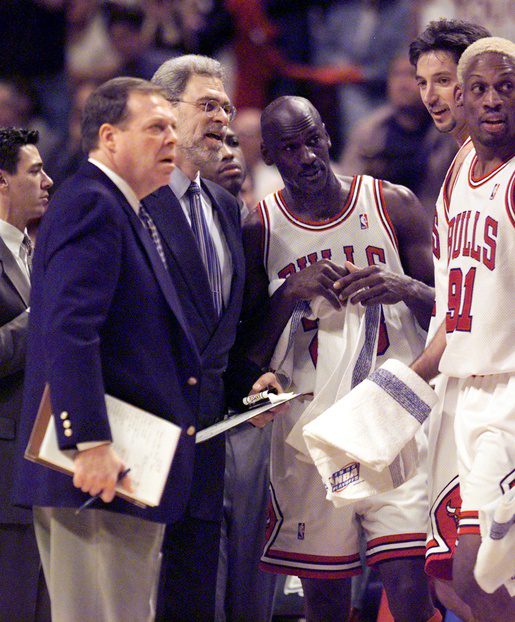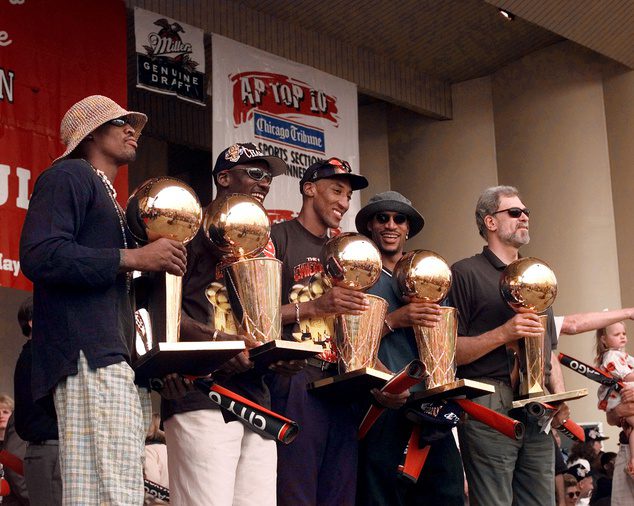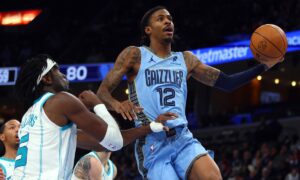The Chicago Bulls weren’t always on top. In the 1980s, they struggled to get past strong teams like the Detroit Pistons and Boston Celtics. But everything changed when Phil Jackson became head coach in 1989. He brought in a new system called the “triangle offense,” which was perfect for Michael Jordan and Scottie Pippen’s playing styles. The team added key players like Horace Grant, John Paxson, and Bill Cartwright, who each played important roles.
Under Jackson’s coaching, Jordan learned to trust his teammates more. While he was still the team’s best player, he understood that winning championships needed everyone to work together. This change in thinking helped the Bulls become unstoppable. They practiced harder than any other team, with Jordan pushing his teammates to get better every day. Let’s look into the history that created the best era of the Chicago Bulls!
The First Three-Peat (1991-1993)
The Bulls won their first NBA championship in 1991, beating Magic Johnson and the Los Angeles Lakers. This win was special because it proved Jordan could win the big games, not just score lots of points. In the finals, Jordan averaged 31.2 points per game and showed he could be both a scorer and a team leader.
The next two championships came against the Portland Trail Blazers in 1992 and the Phoenix Suns in 1993. During these years, the Bulls played some of the best basketball ever seen. They had everything working: Jordan’s scoring, Pippen’s all-around game, Grant’s defense and rebounding, and great shooting from players like Paxson. The team won 67 games in the 1991-92 season, showing they could dominate the regular season and the playoffs.
What made these three years even more special was how the Bulls handled pressure in big moments. In Game 1 of the 1992 Finals, Jordan hit six three-pointers in the first half, famously shrugging his shoulders after each shot as if to say even he couldn’t believe how well he was playing. Against Phoenix in 1993, the team showed their trust in each other when John Paxson hit the championship-winning three-pointer in Game 6, proving the Bulls weren’t just about Jordan’s heroics – they were a complete team that could beat you in many different ways.
The Return and Second Three-Peat (1996-1998)
After Jordan’s first retirement in 1993, many people thought the Bulls’ great years were over. But when he came back in 1995, the team rebuilt itself to be even better. They added Dennis Rodman, who was the best rebounder in the league. With Rodman joining Jordan and Pippen, the Bulls now had three of the best defenders ever on one team.

The 1995-96 Bulls team set a record by winning 72 games in the regular season, losing only 10 games all year – a mark that seemed unbreakable for decades.
The team was so dominant that they started each game with a psychological advantage; opponents often looked beaten before the game even started. They won championships in 1996 (beating the Seattle SuperSonics), 1997 (beating the Utah Jazz), and 1998 (beating the Jazz again). Each series showcased different aspects of the team’s greatness, from Jordan’s famous “Flu Game” in the 1997 Finals where he scored 38 points while seriously ill, to his iconic last shot against the Jazz in 1998 that sealed their final championship.
During this time, the Bulls weren’t just winning – they were changing how basketball was played. Teams started copying their triangle offense and looking for players who could play multiple positions like Pippen. The Bulls showed that having players who could defend multiple positions was just as important as scoring. They also proved that role players like Steve Kerr and Luc Longley were crucial to success, even if they weren’t superstars. Their practice sessions became legendary, with Jordan’s competitive fire pushing everyone to improve every day. Other teams tried to copy not just their playing style, but also their practice intensity and preparation methods, creating a blueprint that many NBA teams still follow today.
Key Players and Their Roles
Michael Jordan was considered the best scorer in basketball history, changing how teams had to play defense. As the clear leader of the team, he pushed everyone to work harder and never accepted anything less than their best effort. Jordan consistently made the biggest shots when the team needed them most, earning a reputation as the most clutch player in NBA history. His defensive skills were just as impressive as his scoring, earning him nine All-Defensive First Team selections. Jordan’s dominance was proven by winning the Finals MVP award all six times the Bulls won championships.
Scottie Pippen showed incredible versatility by playing any position on the court when needed. His defensive skills matched Jordan’s, often guarding the other team’s best player and shutting them down. When Jordan needed rest, Pippen expertly ran the offense, keeping the team’s rhythm going strong. He had a special talent for making his teammates play better, setting them up for easy shots and helping them succeed. Pippen proved to be the perfect partner for Jordan, complementing his playing style and forming what many consider the best duo in NBA history.
Dennis Rodman, who joined the team from 1996 to 1998, dominated the rebounding game like no one else in league history. His tough defense and willingness to guard any opponent made him invaluable to the team. Rodman took pride in doing all the difficult work that other players often avoided, like diving for loose balls and taking charges. His endless energy and excitement on the court lifted the whole team’s spirit and intensity during games.
The Bulls’ success also depended heavily on their supporting cast. Horace Grant played a crucial role from 1991 to 1993 as both a strong defender and reliable rebounder. Steve Kerr became known as one of the most reliable three-point shooters in crucial moments. Ron Harper’s defensive skills helped lock down opposing teams’ best guards. Toni Kukoc earned the nickname “The Croatian Sensation” by providing crucial scoring off the bench when the starters needed rest. Bill Cartwright brought veteran leadership and strong center play, anchoring the team’s defense during their first three championships.
What Made This Era Special:
- Team Chemistry: Everyone knew their role and played it perfectly
- Great Coaching: Phil Jackson kept everyone working together
- Mental Toughness: The Bulls never gave up in big games
- Defense: They could stop other teams from scoring
- Clutch Playing: They always made the big plays when needed

The Bulls’ success during this time wasn’t just about winning games. They changed how people around the world saw basketball. TV ratings went up whenever they played. Kids everywhere wanted to be like the Bulls. Their games became must-watch events.
Throughout their incredible run, the Bulls Dynasty achieved feats that seem almost impossible to match. The team never experienced defeat in an NBA Finals series, winning all six championships they competed for. During the 1995-96 season, they set what seemed like an unbreakable record by winning 72 games in a single season.
The Bulls created a perfect storm of talent by having the greatest player in Michael Jordan, the most innovative coach in Phil Jackson, and the most dominant rebounder in Dennis Rodman all working together. Their dominance extended beyond just championships, as they set records for wins in both regular season and playoff games. The team’s popularity reached unprecedented levels, with their games becoming some of the most-watched events in NBA history.
The team’s influence continues to shape basketball today in several important ways. Modern NBA teams now prioritize versatility, looking for players who can handle multiple positions on the court just like Pippen and Jordan did. The Bulls’ strategy of turning strong defense into fast-break opportunities has become a standard approach for successful teams.
Today’s coaches’ study and implement detailed game plans similar to Phil Jackson’s famous triangle offense. Teams now follow the Bulls’ blueprint of building their rosters around superstars while carefully selecting role players who fit specific needs. Perhaps most importantly, successful organizations try to create the same kind of winning culture that made the Bulls so special, where every player understood their role and worked together toward a common goal.
The Bulls dynasty ended after their last championship in 1998. Jordan retired again, Pippen was traded, Rodman left, and Jackson stopped coaching the team. While other teams have won multiple championships since then, none have matched what the Bulls did in the 1990s.
Today, when people talk about the greatest teams ever, the 1990s Bulls are always mentioned first. They showed that with the right mix of talent, coaching, and teamwork, a team could become truly unstoppable. Their six championships in eight years set a standard that teams still try to reach today.









